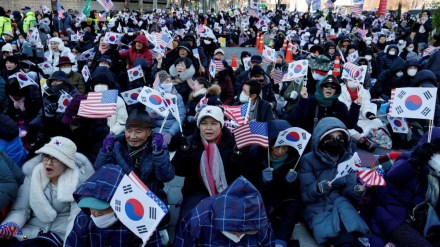South Korea plunged into a political crisis last week when President Yoon Suk Yeol declared martial law. Within hours, a civil protest and a unanimous vote to scrap that decision followed. Anvitii Rai explains why Yoon’s troubles aren’t over though he survived an impeachment vote on Saturday.
l What’s behind the current political crisis?
ONE OF THE key changes on December 3, South Korean President Yoon Suk Yeol declared a national emergency in a televised address, claiming that “anti-state forces” and North Korea were threatening the country. Subsequently, army units were deployed to take over the National Assembly. However, this sparked a huge backlash and citizens gathered around the Parliament in thousands to protest. Opposition lawmakers rushed to the scene to participate in an emergency vote the same night, and six hours later, 190 lawmakers unanimously voted to lift the martial law. Last Friday, Yoon, in another televised address ahead of his impeachment vote, apologised, stating that “I am very sorry and would like to sincerely apologise to the people who were shocked (about the declaration of martial law).”
On Saturday, an impeachment vote against him failed as representatives from his party, the People Power Party (PPP) boycotted the vote, even when its leader Han Dong-hoon stated in response to the President’s apology earlier that “his early resignation is inevitable.”
l A chequered history of presidential leadership
THE OFFICE OF the President of South Korea has, bizarrely, seen leaders prosecuted more than any developed democratic nation. Park Geun-hye, the country’s first female leader, was incarcerated in 2018 after being found guilty of abuse of power and corruption. Her predecessor, Lee Myung-bak, was investigated over allegations of stock price manipulation and was sentenced to 17 years in prison for corruption and bribery in 2020. Another former president, Roh Moo-hyun, committed suicide in 2009 while under investigation for allegedly receiving huge bribes. According to the BBC, “In South Korea, prosecutions have almost become a political tool — a threat for the opposition to wield. It may partly explain why President Yoon took such drastic action.”
l Previous trysts with martial law
WHILE THE DECLARATION of a state of emergency and subsequent martial law can send shockwaves across any country, in South Korea, it can trigger public trauma. The nation’s history, till even 40 years or so ago, was marred with martial rule and dictatorships. Martial law was used time and again to muzzle the opposition and stop any anti-government demonstrations. Army general Park Chung-hee led troops into Seoul in the early hours of May 16, 1961, in the country’s first coup. He led South Korea for nearly 20 years. Following his assassination in 1979, Major general Chun Doo-hwan led tanks and troops into Seoul in December 1979 in the country’s second coup, and his crackdown on pro-democracy forces resulted in the deaths of 200 people. Democracy finally prevailed in 1987, but even then, one of the people involved in Chun’s coup was elected. President Yoon’s martial law imposition was the first since this tumultuous time.
Per Barron’s, the current crisis, if it continues, may dent confidence in an economy that had only narrowly avoided a recession last quarter.
l Asia’s long history of coups & dictatorships
ASIAN COUNTRIES have seen several military coups as recently as in the present decade. Pakistan immediately comes to mind, where such coups have been quite regular. Communist forces imposing martial law in East Asian nations are also quite common. North Korea functions as a one-party totalitarian dictatorship, with the Kim family at the helm of political affairs since 1948.Cambodia has had a long history of authoritarian rule, with the country witnessing devastating revolutionary excesses of the Pol Pot regime in the 70s. Both Vietnam and Thailand are no strangers to coups and military rule. The Philippines saw martial law for 14 years under Ferdinand Marcos with his reign seen as one of Asia’s most notorious kleptocracies. Myanmar has been under martial rule since 2021. Hong Kong has seen a cycle of protests and their subsequent snuffing by China in the past decade. Meanwhile, China continues to hold war games around Taiwan which it claims as its own territory.
l What will happen next?
YOON’S REASONS FOR such a drastic step have been gauged as frustration over being a lame duck leader, as PPP lost the majority in the National Assembly, and increasing pressure to investigate First Lady Kim Keon-hee on charges of accepting bribes. Following his failed gamble at mimicking his predecessors at snuffing out the opposition, he might be forced to resign. As the impeachment vote failed due to a walkout by PPP members, the opposition Democratic Party has said it will stage another vote and ensure more participation, while the PPP has stated that it will find a way to resolve the situation in a “more orderly, responsible way”. If Yoon ends up resigning, the Constitution requires a presidential election within 60 days upon his departure.
